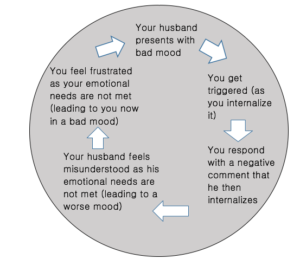Each Friday, we are answering questions about relationships! See this week’s entry and response below:
Writer: I am interested in having my question about relationships answered. How does one not let a spouse with wildly fluctuating moods not effect their own life? If my spouse decides to shift moods it can drain all my energy in an instant, thus leaving me angry and frustrated along with a sense of resentment and hostility towards him
Lexi Heinzer M.A. IMF#100931: It sounds like you are a person who gains your own energy from other’s energy- thus making it even more difficult to not allow your spouse’s mood to negatively affect you. Just as your spouse does not control your mood, you do not control his but you both influence them. Think of it as a cycle:

It is true that moods are contagious! As you can see from the cycle above, it is apparent that your emotional reaction from your husband’s bad mood is to mimic it. This is a normal response for all humans! When a person becomes grumpy, emotionally distant, or irritable it is natural to take this personally and internalize it. The best thing to do is strategize what you want your response to be. Do you want to be emotionally vulnerable with your spouse and tell him that deep down, it is hurtful because it may feel like an attack towards you? Would you feel more comfortable telling your partner that his bad moods make you emotionally distant? Or, would it feel best to let your partner know that when his bad moods come up you will leave the room until his mood has subsided (maybe giving him a word or body cue that you are leaving due to wanting to break the cycle).
The truth is, moodiness is a sign of emotional instability. You do not control this, and you are not to blame for it. Once you can start believing this for yourself, you will be able to separate your emotions and react in a way that will appropriately break the negative cycle. Your energy is not worth being drained and your day is not worth being ruined. You have the power to change how you respond, which gives you back your energy when you remind yourself “His bad mood is not because of me and I am not to blame. I do not want my day to be ruined. Although I am bothered that he is in a bad mood, I have the power and control to choose how I will respond to this because I care about myself and believe that I deserve a good day. Although I do not control his mood, my response may influence it in a positive manner.”
Send us in your question, and see it get anonymously answered next week!
Thoughts? Comment us below!
Posted: February 3, 2018 by Lexi Heinzer
Relationship Friday
Each Friday, we are answering questions about relationships! See this week’s entry and response below:
Writer: I am interested in having my question about relationships answered. How does one not let a spouse with wildly fluctuating moods not effect their own life? If my spouse decides to shift moods it can drain all my energy in an instant, thus leaving me angry and frustrated along with a sense of resentment and hostility towards him
Lexi Heinzer M.A. IMF#100931: It sounds like you are a person who gains your own energy from other’s energy- thus making it even more difficult to not allow your spouse’s mood to negatively affect you. Just as your spouse does not control your mood, you do not control his but you both influence them. Think of it as a cycle:
It is true that moods are contagious! As you can see from the cycle above, it is apparent that your emotional reaction from your husband’s bad mood is to mimic it. This is a normal response for all humans! When a person becomes grumpy, emotionally distant, or irritable it is natural to take this personally and internalize it. The best thing to do is strategize what you want your response to be. Do you want to be emotionally vulnerable with your spouse and tell him that deep down, it is hurtful because it may feel like an attack towards you? Would you feel more comfortable telling your partner that his bad moods make you emotionally distant? Or, would it feel best to let your partner know that when his bad moods come up you will leave the room until his mood has subsided (maybe giving him a word or body cue that you are leaving due to wanting to break the cycle).
The truth is, moodiness is a sign of emotional instability. You do not control this, and you are not to blame for it. Once you can start believing this for yourself, you will be able to separate your emotions and react in a way that will appropriately break the negative cycle. Your energy is not worth being drained and your day is not worth being ruined. You have the power to change how you respond, which gives you back your energy when you remind yourself “His bad mood is not because of me and I am not to blame. I do not want my day to be ruined. Although I am bothered that he is in a bad mood, I have the power and control to choose how I will respond to this because I care about myself and believe that I deserve a good day. Although I do not control his mood, my response may influence it in a positive manner.”
Send us in your question, and see it get anonymously answered next week!
Thoughts? Comment us below!
Category: Uncategorized
Contact
260 Maple Court, Suite 228
Ventura, CA 93003
Call:
confidential
Email:
Like Us On Facebook
Pages